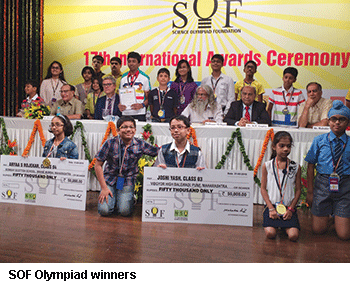 Maharashtra’s state education ministry has softened its stance on private agencies conducting extra-curricular competitive tests and talent search exams for primary-secondary students. On January 7 (2017), the government had imposed a complete ban on schools from participating in such competitive tests/exams. However, on October 4, through a revised GR (government resolution) it issued new guidelines for agencies conducting talent search competitions/academic olympiads. Private agencies will now require clearance from the state’s education ministry to conduct these olympiads.
Maharashtra’s state education ministry has softened its stance on private agencies conducting extra-curricular competitive tests and talent search exams for primary-secondary students. On January 7 (2017), the government had imposed a complete ban on schools from participating in such competitive tests/exams. However, on October 4, through a revised GR (government resolution) it issued new guidelines for agencies conducting talent search competitions/academic olympiads. Private agencies will now require clearance from the state’s education ministry to conduct these olympiads.
The earlier ban on supplementary testing had come amidst fears of a nexus between private testing agencies and school managements forcing students to participate in olympiads, putting additional pressure on students. Parents were often made to pay huge sums for entry into olympiads. However, following requests from private schools for continuation of academic olympiads/competitive tests, the state education ministry decided to allow them subject to their organisers fulfilling certain pre-conditions.
“Conducting extra-curricular tests is a profit-making business attracting several fly-by-night operators. We had received complaints about children being encouraged to attend extra classes and buy books to study for these competitions besides following their regular school syllabus. The new regulations will ensure a check on this money making racket,” says Nand Kumar, principal secretary (education), Maharashtra.
There are more than 23 supplementary tests/academic olympiads conducted by various agencies including state-level teachers’ associations which conduct the prabhutva and pravinya math exams, not-for-profit organisations such as Science Olympiad Foundation (SOF) and Eduheal Foundation (EHF) and private education groups like SMO Education and KACE which assess students’ summative and formative knowledge or age appropriate IQ levels.
Despite the government’s reservations about these extra-curricular tests, the response of educational institutions has been phenomenal. EHF’s olympiads test 600,000 students annually while SOF draws participation from 42,800 schools in the six-subject olympiad exams it conducts worldwide. Most of these agencies give away cash prizes to winners. For instance, SOF has budgeted Rs.15.2 crore for awards, scholarships, gifts and felicitations etc to olympiad winners in the academic year 2017-18.
According to the new GR, managements which run more than 25 schools can conduct supplementary testing in their schools. Tests run by state-level teachers’ associations and non-governmental organisations will also be allowed if they are conducted on a no-profit no-loss basis. All testing agencies will be required to submit costs involved in designing the test and justify fees per student. The government will also release a list of supplementary tests approved by it. However, schools cannot make writing these tests/olympiads compulsory.
Testing agencies are piqued with the GR’s decree on the content of the tests which needs to be aligned to existing syllabuses, or test knowledge about national heroes or promote personality development.
“The idea is to promote education beyond the curriculum and allow parents to analyse their child’s capability vis-a-vis his peers in class, city, state, country and even globally. At Science Olympiad Foundation, we have a team of highly qualified domain experts who work on designing test papers. Our detailed student performance report provides a competence matrix that is recognised by the IIMs and several other postgraduate institutions which give weightage to our scores and rankings. This could not have happened if we weren’t developing high quality content. I think the interference with the capabilities we test is unnecessary,” says an SOF official.
School managements have mixed reactions to the new GR. But most agree that outsourced summative as well as diagnostic assessments are well-researched and exhaustively analyse students’ strengths and weaknesses. Comments Anne Correa, principal of the all-boys St. Stanislaus School, Mumbai: “Supplementary competition exams add value to a student’s preparation for the future. Practice of the multiple-choice format and improved speed gives them an edge while cracking competitive exams like JEE etc. We willingly offer students a platform for these exams, but preparing for and writing them is voluntary. So there is really no need to ban competition testing.”
Dipta Joshi (Mumbai)























